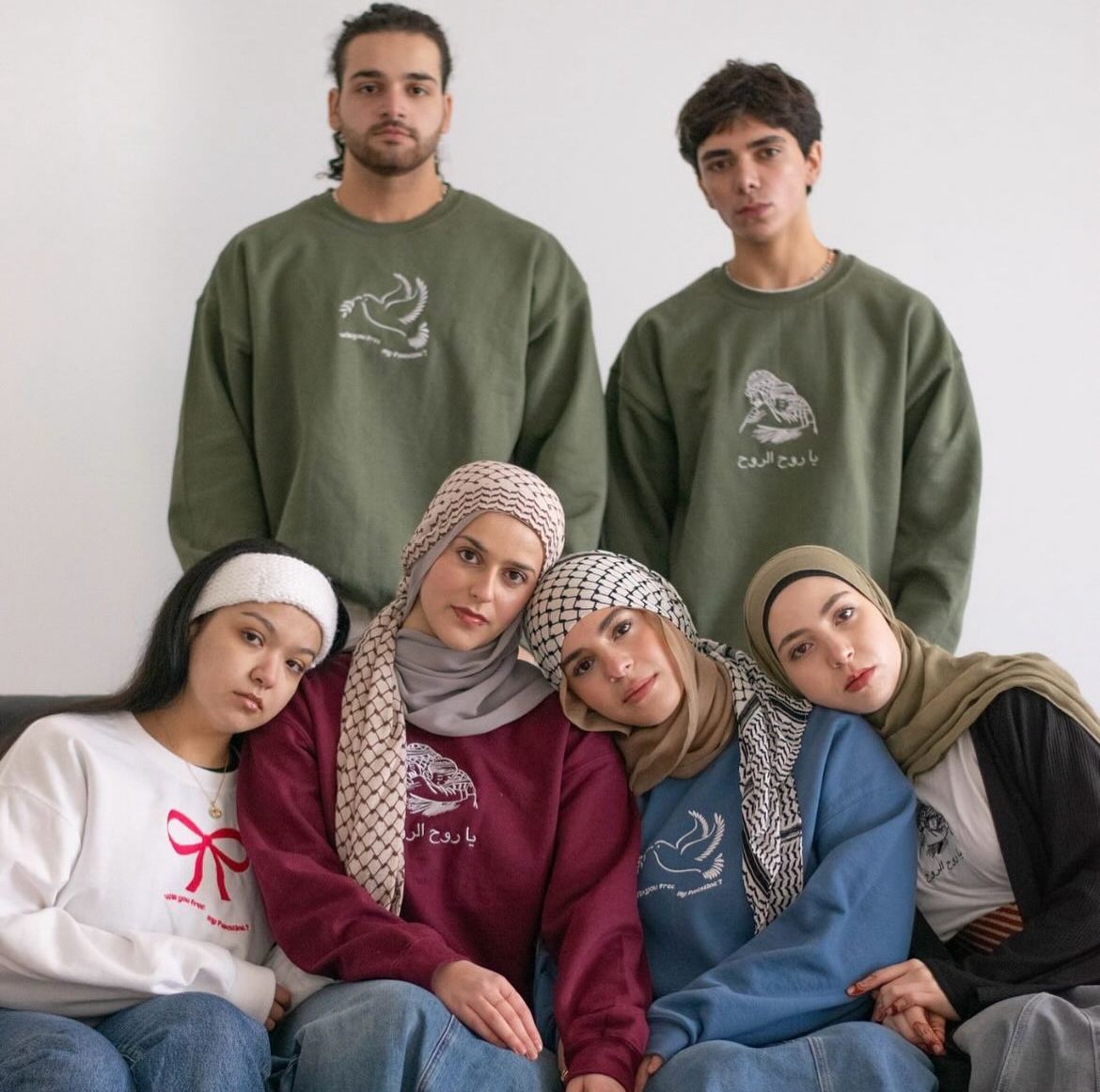Small Businesses Support Palestine
Gallery

Olive Root Apparel is a clothing brand that was founded this January by University of Detroit Mercy sophomore, Lina Mahmoud, who is Palestinian and has advocated for her country her whole life. Along with being a student and running her business, Mahmoud is the President of the UMD Students for Justice in Palestine.
Olive Root Apparel runs out of an online Etsy store that ships throughout the United States. The shop’s Instagram features professionally shot promotions with local Palestinians modeling the merchandise. Olive Root Apparel takes a modern and understated twist on activism clothing. Embroidered sweatshirts and hoodies, tote bags, and phone cases with phrases like “Will you free my Palestine?” and “Soul of my Soul” make it easy for customers to incorporate Mahmoud’s pieces into their wardrobes while still supporting a cause they believe in.
“Ultimately, I wanted to provide an alternative that allows one to not only ‘wear your roots with pride,’ but show solidarity on a constant basis,” said Mahmoud.
Given her support for Palestine, Mahmoud has faced online harassment. Mahmoud said, “When I began promoting Olive Root Apparel on my personal TikTok, I received many Zionist hate comments, and the Zionists have put their efforts into reporting and banning my company’s Instagram.” The backlash only fuels her determination to continue advocating for Palestine.
Along with selling her merchandise online, Mahmoud has attended several bazaars in Dearborn, including the Ramadan Bazaar hosted by the Islamic Center of Detroit. The event gives local businesses opportunities to sell their goods and expand their customer base. Fifteen percent of Olive Root Apparel’s proceeds are donated directly to Gaza through the Palestine Children’s Relief Fund (PCRF).
ZAIDA is a Palestinian-owned business based in Canton, MI. It was opened by Lena Jayyousi and her husband four years ago. ZAIDA sells custom handmade necklaces, bracelets, pacifier clips and diaper pins. Jayyousi says the inspiration behind her business was “the Quranic verses that remind everyone to read the Quran when they see your precious baby.” The verses she is referring to are the Ayat Al-Kursi and the Four Quls. The Ayat Al-Kursi, or the Throne Verse, is one of the most memorized verses of the Quran as it summarizes the Islamic faith and is recited for protection. The Four Quls, or the Protecting Surahs, provide protection against Jinn and black magic.
ZAIDA’s pins feature colorful charms, initials and symbols like the evil eye and the hand of Fatima. The hand of Fatima represents power and strength, and protects against negative energy. ZAIDA also carries charms inscribed with Islamic verses and “Allah.” The charms are meant to welcome blessings for infants and their families as well as protect them from harm. Protection symbols and talismans date back to the early 9th century in Islamic culture. Many Muslims believe that by seeing or touching an item with “Allah” written on it, they will be protected from evil.
ZAIDA’s Instagram page is filled with posts supporting Palestine. In one, Jayyousi writes about those trapped in Gaza: “I can’t decide if I should feel grateful for this privilege or the privilege that I have and they don’t,” Jayyousi said. “I want Palestine to celebrate this Ramadan together like the rest of the world.” Jayyousi adds, “Since the war and prior to October, ZAIDA has always given profits to the PCRF and The Amity Foundation.”
Abu K’nafa is a multigenerational business run by the Abukaff family and based in Ypsilanti, MI. They specialize in knafeh, an Arabic dessert made with spun pastry called kataifi, sugar syrup called attar, ghee, lemon, and four different types of cheese. Taha Abukaff, the grandfather of the family, learned his skills in Palestine and brought the cultural desert to Dearborn in 1984. In 2019, his grandson Malik Abukaff founded Abu K’nafa.
In 2023, Abu K’nafa was featured on an episode of the Hulu original show, “Taste the Nation,” hosted by Padma Lakshmi, an American-Indian model, author and activist. In the episode, Malik Abukaff says “I love knafeh because it keeps me rooted. It’s a comfort food.” To Palestinians, knafeh isn’t just a dessert, it’s a symbol of resilience and pride. Abu K’nafa offers catering and sells DIY kits online to bring knafeh into homes all over the United States. Abu K’nafa has partnered with PCRF Detroit to raise funds for children in Gaza.
Information on Abu K’nafa can be found at their website: abuknafa.com and on Instagram @abuknafa. Information on ZAIDA is available at their website: zaida.co and on Instagram @zaida_co. Information on Olive Root Apparel can be found on Instagram @oliverootapparel.
